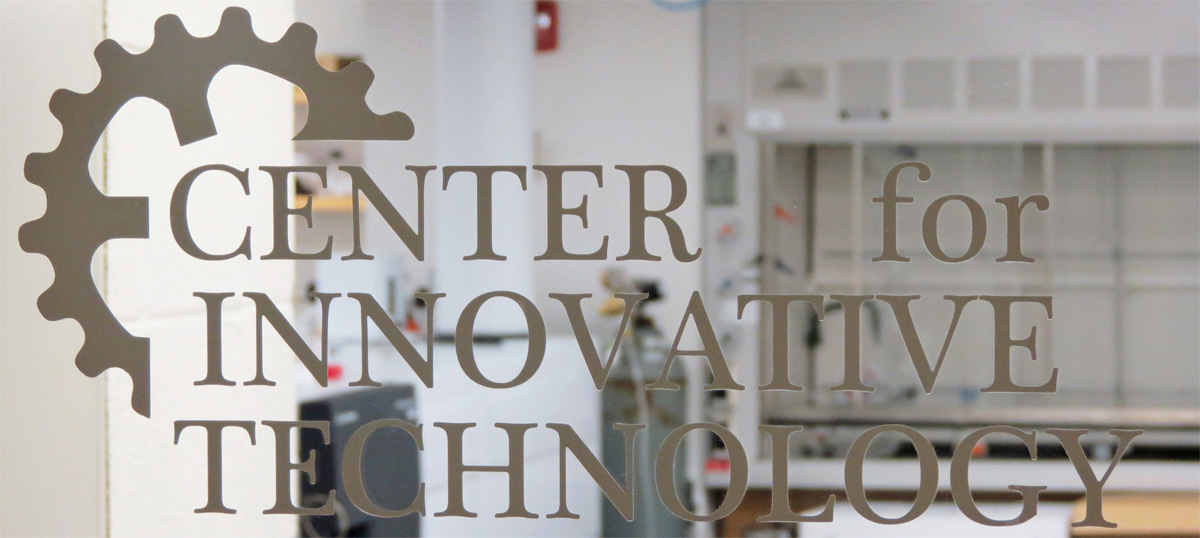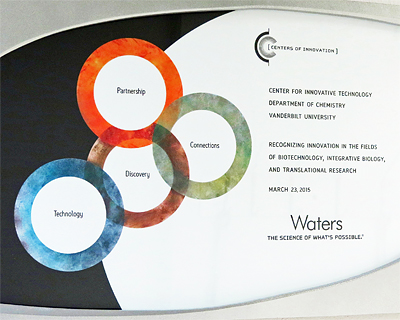The Center for Innovative Technology (CIT) at Vanderbilt University
A state-of-the-art small molecule omics shared resource center and collaborative analytical facility specializing in a range of mass spectrometry and confocal screening techniques.
The CIT focuses on metabolomics and lipidomics analyses using a range of mass spectrometry instrumentation and provides the infrastructure and expertise to measure both untargeted (discovery) and targeted (validation, quantification) small molecules. The Center places an emphasis on the use and development of numerous separation technologies coupled to MS including hydrophobic/hydrophilic liquid chromatography (RPLC and HILIC) and ion mobility-mass spectrometry (IM-MS). As a result, the CIT houses an array of cutting-edge instrumentation and technologies that are supported by current state-of-the-art informatics and data analysis software.
The combination of these capabilities forms the basis for the analyses of diverse biospecimen sample matrices ranging from cells, tissues, and biofluids to advanced systems such as organ-on-chip microfluidics and other 3-dimensional cell culture devices.
Further, the CIT provides several routine and advanced services that can be tailored to the goals of individual research projects. If needed, new workflows can be established for method development, targeted biomolecule measurement acquisition, and/or metabolite validation.
We enable innovative research using Untargeted Metabolomics Expertise (Hypothesis-Generating) Targeted Metabolomics Competencies (Hypothesis-Driven) High-Content Screening Microscopy Technology
The goal of metabolomics is to measure the complex collection of small molecule metabolites present within a fluid, cell, or tissue. Unlike an organism’s genome, metabolomic measurements are dynamic and thus the analysis results are context dependent. Consequently, either reproducible steady state or temporal changes associated with disease state, toxicant exposure, or drug administration can be identified.
Metabolite identifications are assigned based on high mass accuracy measurements, isotope distributions, tandem mass spectrometry (MS) fragmentation patterns, and comparisons with spectral libraries and standards. Data analysis results can reveal unique biochemical fingerprints of cellular processes or responses. For this reason, results can be exploited as a 1) discovery-based approach for generating novel hypotheses or 2) used for a better understanding of physiological processes mediated by genetic or environmental perturbations.
COLLABORATIVE RESEARCH SUPPORT
For routine applications the CIT offers the following services:
- Consultation for assistance with experimental design, explanation of service levels, biostatistical evaluation (if needed)
- Cost estimates for funding applications
- Assistance with grant applications
- Sample preparation and processing
- Small molecule omics analyses (discovery and/or validation workflows)
- Analysis of metabolites, amino acid panels, lipids, pathways
- High-content, confocal screening microscopy
- Data processing & interpretation (e.g., filtering “noise”, data mining/prioritization, basic and advanced statistical analyses, pathway interpretation, clarification of biol. mechanism)
CUTTING-EDGE METABOLOMICS TECHNOLOGY
We accommodate a broad-scale small molecule omics research, data analytics, and data mining with our extensive lineup of state-of-the-art mass spectrometry instrumentation and software.
In addition, our shared resource center offers a highly flexible, full-service tailored approach for a wide range of applications. Our Center aims to guide you and your team to design the best fit-for-purpose experiment based on your hypothesis.
Together with the laboratory of Professor John A. McLean, the CIT is a Waters Center of Innovation Partner and Agilent Thought Leader.
For additional information regarding our capabilities and specialties, please review our peer-reviewed publications.
SUBMIT A PROJECT REQUEST
If you need results fast, jump-start the conversation by sending a project request via Vanderbilt’s iLab interface below. Sending a request in iLab helps us gather vital project information and allows us to get started more quickly.
Our team has over 30 years of combined experience in mass spectrometry, data analysis, and informatics pipelines. We look forward to collaborating with you.
CONTACT US
To discuss your next small molecule omics research project, please request a consultation through iLab or contact us directly. We look forward to providing you with detailed information about the services we offer.
EDUCATION AND OUTREACH
The CIT mass spectrometry shared resource is also committed to the training, education, and research for next generation scholars. Consequently, the Center participates in several outreach and training programs at Vanderbilt University, including:
- Vanderbilt Center for Science Outreach (VCSO, high school students)
- Systems Biology and Bioengineering Undergraduate Research Experience (SyBBURE, undergraduate students)
- Chemical-Biology Interface Training Program (CBI, graduate students)
- Quantitative and Chemical Biology Graduate Program (QCB, graduate students)
- Interdisciplinary Graduate Program in the Biomedical Sciences (IGP, graduate students)




 Follow Us
Follow Us